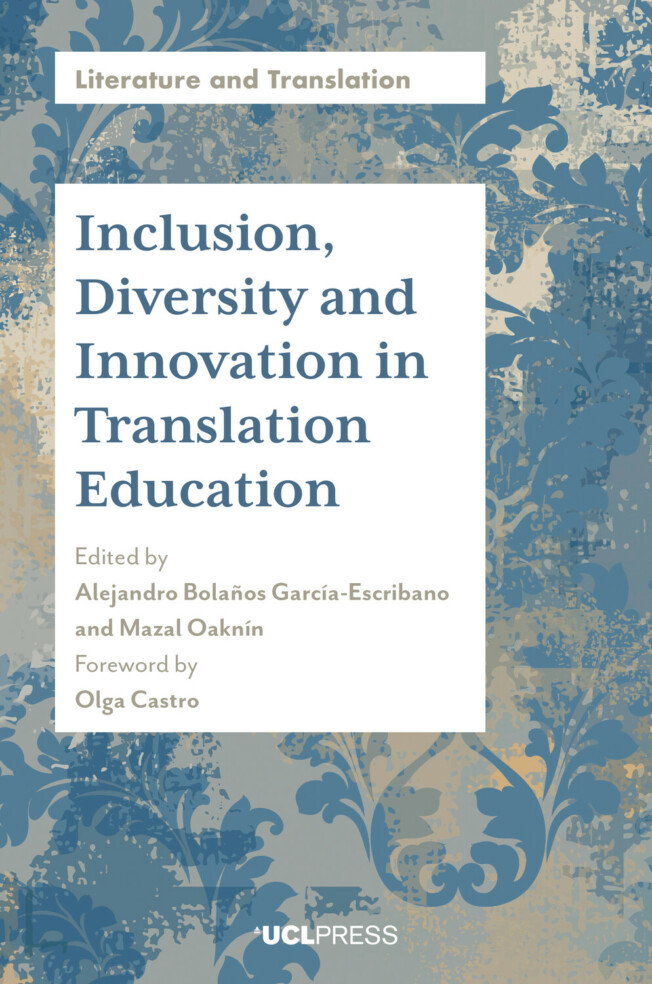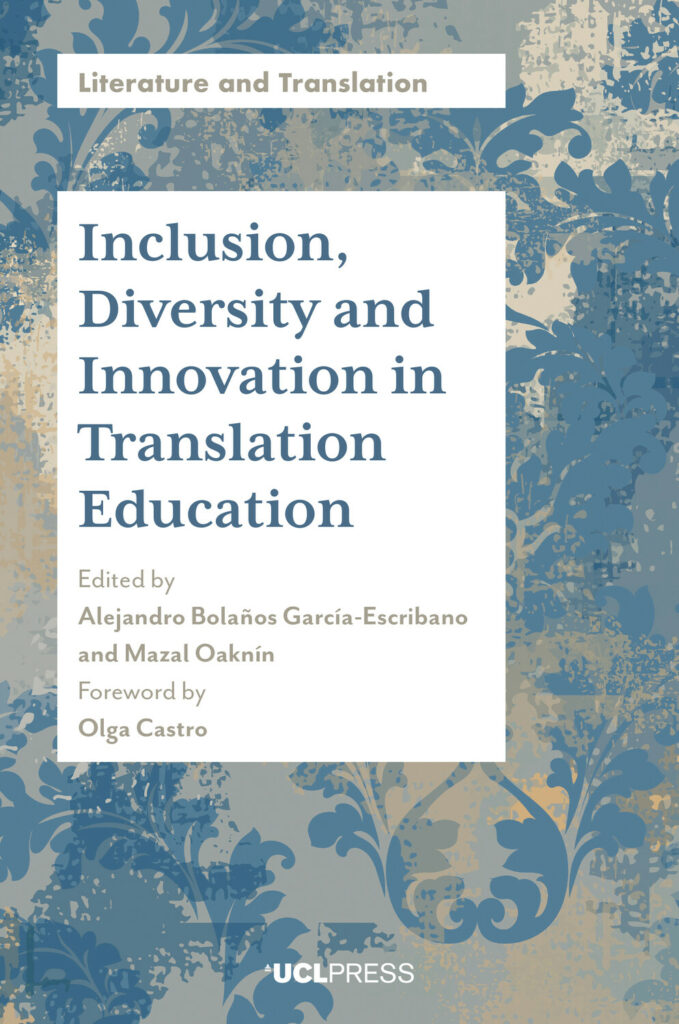
Inclusion, Diversity and Innovation in Translation Education
Alejandro Bolaños García-Escribano (Editor), Mazal Oaknín (Editor), Olga Castro (Foreword)
Series: Literature and Translation
Through examples of literary and audiovisual translation teaching practices, Inclusion, Diversity and Innovation in Translation Education places a novel emphasis on equality, diversity and inclusion (EDI) synergising the latest research advancements in EDI and translation curricula.
The contributors revisit how languages and translation are currently taught and explore the relevance of EDI values from an interdisciplinary perspective. The chapters contain proposals of best teaching practices and teacher training guidance alongside examples of research-led teaching scenarios. There is a twofold rationale behind this volume: firstly, identifying links between literary and audiovisual translation teaching practices, which often demand great creativity inside and outside the classroom; and, secondly, placing greater emphasis on EDI-focused methods and themes. Following this approach, readers are invited to consider pressing societal issues such as (media) accessibility, intersectionality, LGBTQI+ and race, among others, and to embed them in their language and translation teaching practices.
Praise for Inclusion, Diversity and Innovation in Translation Education
‘This collection brings together a diverse group of scholars of various identities and backgrounds to provide us with invaluable lessons on how to increase a sense of belonging in university classrooms, especially among minoritised students. An inspiring and empowering archive of justice-oriented translation pedagogies.’ Emek Ergun, University of North Carolina at Charlotte
‘A topical and thorough manual for academics, instructors, professional translators and apprentices who will gain a critical insight into the need to develop competences about EDI during the educational years.’ Marcella De Marco, London Metropolitan University
‘A rich, kaleidoscopic collection that breathes life into EDI by weaving technological advances, intersectionality, accessibility and social justice into audio-visual and literary translation classrooms.’ Şebnem Susam-Saraeva, University of Edinburgh
List of figures
List of tables
List of contributors
Foreword by Olga Castro
Preface
Acknowledgements
1 Introduction
Alejandro Bolaños García-Escribano and Mazal Oaknín
Part I: New Technologies
2 Translating the unknown: a case study on the usefulness of machine translation in comparative literature research
Sergio Portelli
3 Learning foreign languages through telecollaboration: embedding didactic audiovisual translation in the language classroom
Alejandro Bolaños García-Escribano and Beatriz Cerezo Merchán
4 Teaching languages for social and cooperation purposes: using didactic media accessibility in foreign language education
María del Mar Ogea Pozo and Noa Talaván
Part II: Transmedia
5 Synergising literature and film in the French literary translation classroom: a focus on gender equality
Soledad Díaz-Alarcón
6 Transmediation: pedagogical applications to film adaptation in modern foreign language education
Carmen Herrero and Isabelle Vanderschelden
Part III: Cross-disciplinary Intersections
7 Translation as queer practice: (de)gendering feminist language in the poetry of Xi Xi and Zhai Yongming
Xiaofan Amy Li
8 Translating intersectional feminism: a ‘modern’ language classroom
Mazal Oaknín
9 Queer challenges and affordances of literary translation in the foreign language classroom
John Gray
10 Final reflections: why I am still talking to white people about race
Haydn Kirnon
Index
DOI: 10.14324/111.9781800087125
Number of pages: 262
Number of illustrations: 33
Publication date: 01 October 2024
PDF ISBN: 9781800087125
EPUB ISBN: 9781800087156
Hardback ISBN: 9781800087149
Paperback ISBN: 9781800087132
Alejandro Bolaños García-Escribano (Editor) 
Alejandro Bolaños García-Escribano (SFHEA, MCIL, CL) is Associate Professor in Audiovisual Translation at University College London.
Mazal Oaknín (Editor) 
Mazal Oaknín (FHEA) is Associate Professor (Teaching) and Language Coordinator of Spanish at University College London.
Olga Castro (Foreword)
‘A timely, original, and high-quality contribution to knowledge about an important topic. I think anyone interested in EDI in the context of higher education could find something of value in this work, even if they are not involved in audiovisual or literary translation. International collaborations that raise awareness of EDI issues, foster inclusive classrooms, encourage constructive dialogue, and provide evidence to counter anti-EDI arguments have been suggested as steps that can be taken within the academy to defend and promote social justice (Ng et al. 2025). This edited volume can act as a practical guide to implementing one, a few, or all these points.’
The Translator
‘Critical themes are thoughtfully explored … the authors present compelling arguments and innovative perspectives that enhance the discourse on translation education.’
Babel
‘This collection brings together a diverse group of scholars of various identities and backgrounds to provide us with invaluable lessons on how to increase a sense of belonging in university classrooms, especially among minoritised students. An inspiring and empowering archive of justice-oriented translation pedagogies.’
Emek Ergun, University of North Carolina at Charlotte
‘A topical and thorough manual for academics, instructors, professional translators and apprentices who will gain a critical insight into the need to develop competences about EDI during the educational years.’
Marcella De Marco, London Metropolitan University
‘A rich, kaleidoscopic collection that breathes life into EDI by weaving technological advances, intersectionality, accessibility and social justice into audio-visual and literary translation classrooms.’
Şebnem Susam-Saraeva, University of Edinburgh
Related titles
Inclusion, Diversity and Innovation in Translation Education
Through examples of literary and audiovisual translation teaching practices, Inclusion, Diversity and Innovation in Translation Education places a novel emphasis on equality, diversity and inclusion (EDI) synergising the latest research advancements in EDI and translation curricula.
The contributors revisit how languages and translation are currently taught and explore the relevance of EDI values from an interdisciplinary perspective. The chapters contain proposals of best teaching practices and teacher training guidance alongside examples of research-led teaching scenarios. There is a twofold rationale behind this volume: firstly, identifying links between literary and audiovisual translation teaching practices, which often demand great creativity inside and outside the classroom; and, secondly, placing greater emphasis on EDI-focused methods and themes. Following this approach, readers are invited to consider pressing societal issues such as (media) accessibility, intersectionality, LGBTQI+ and race, among others, and to embed them in their language and translation teaching practices.
Praise for Inclusion, Diversity and Innovation in Translation Education
‘This collection brings together a diverse group of scholars of various identities and backgrounds to provide us with invaluable lessons on how to increase a sense of belonging in university classrooms, especially among minoritised students. An inspiring and empowering archive of justice-oriented translation pedagogies.’ Emek Ergun, University of North Carolina at Charlotte
‘A topical and thorough manual for academics, instructors, professional translators and apprentices who will gain a critical insight into the need to develop competences about EDI during the educational years.’ Marcella De Marco, London Metropolitan University
‘A rich, kaleidoscopic collection that breathes life into EDI by weaving technological advances, intersectionality, accessibility and social justice into audio-visual and literary translation classrooms.’ Şebnem Susam-Saraeva, University of Edinburgh
‘A timely, original, and high-quality contribution to knowledge about an important topic. I think anyone interested in EDI in the context of higher education could find something of value in this work, even if they are not involved in audiovisual or literary translation. International collaborations that raise awareness of EDI issues, foster inclusive classrooms, encourage constructive dialogue, and provide evidence to counter anti-EDI arguments have been suggested as steps that can be taken within the academy to defend and promote social justice (Ng et al. 2025). This edited volume can act as a practical guide to implementing one, a few, or all these points.’
The Translator
‘Critical themes are thoughtfully explored … the authors present compelling arguments and innovative perspectives that enhance the discourse on translation education.’
Babel
‘This collection brings together a diverse group of scholars of various identities and backgrounds to provide us with invaluable lessons on how to increase a sense of belonging in university classrooms, especially among minoritised students. An inspiring and empowering archive of justice-oriented translation pedagogies.’
Emek Ergun, University of North Carolina at Charlotte
‘A topical and thorough manual for academics, instructors, professional translators and apprentices who will gain a critical insight into the need to develop competences about EDI during the educational years.’
Marcella De Marco, London Metropolitan University
‘A rich, kaleidoscopic collection that breathes life into EDI by weaving technological advances, intersectionality, accessibility and social justice into audio-visual and literary translation classrooms.’
Şebnem Susam-Saraeva, University of Edinburgh

